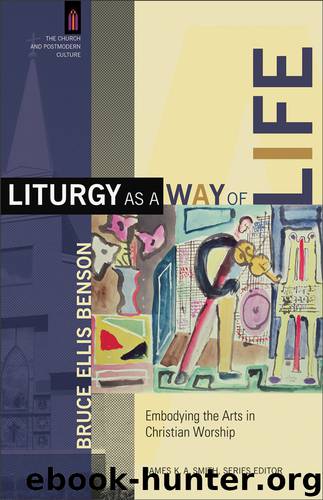Liturgy as a Way of Life by Bruce Ellis Benson

Author:Bruce Ellis Benson
Language: eng
Format: epub
Tags: REL051000, REL055020, Worship, Liturgics, Christianity and art, Christianity and the arts, Liturgy and art, Liturgy and the arts, Postmodernism—Religious aspects–Christianity
Publisher: Baker Publishing Group
4
On Not Being an Artistic Whore
“Work is what you do for others, Liebchen, art is what you do for yourself.” That quote comes from the servant of the artistic patron of Georges Seurat, painter of “Sunday at the Grand Jatte.”[172] From the servant’s point of view, his own work is something he does for other people. In contrast, the painting that he observes Seurat working on each Sunday is purely for Georges himself. We have already seen that this is a fairly common view about art. And surely there is something right about improvising for oneself—that one does so for one’s own pleasure and the expression of one’s thoughts and feelings. But, having said that, is that enough? If art is really only something one does for oneself, then it is rather solipsistic in nature—which is to say it is purely about oneself. I have certainly known artists—for instance, some of my own students—who claim that they enjoy performing music or painting just for themselves. I can’t see anything wrong with that. Yet, in my experience, few artists make artistic things only for themselves. Normally, artists want others to share and appreciate their art, which means they are not making art simply for themselves. But this raises a number of questions. First, for whom should we be making art? Second, how does what artists do relate to the community at large? Third, are there certain kinds of art that are “better” than others?
While these questions might at first seem to be important only for those who are artists in the more specialized sense of the term, they are questions that face all of us. If we are living works of art, then for whom are we fashioning our lives? One immediate answer is: God. Without doubt, all that we do is for God, to whom we owe our very beings. Yet the answer is inevitably more complicated than that, for all of us are part of communities—such as the communities of family, friends, church, and much more. Indeed, it is safe to say that one complication regarding the question of “for whom” is that we are all part of multiple communities, and satisfying all members in every community of which we’re a part may not even be possible.
In any case, these questions bring us back to the dilemmas facing Asher Lev, who is forced to choose which community he will ultimately be loyal to.
Download
This site does not store any files on its server. We only index and link to content provided by other sites. Please contact the content providers to delete copyright contents if any and email us, we'll remove relevant links or contents immediately.
The Secret Power of Speaking God's Word by Joyce Meyer(3175)
More Language of Letting Go: 366 New Daily Meditations by Melody Beattie(3018)
To Light a Sacred Flame by Silver RavenWolf(2814)
How Proust Can Change Your Life by Alain De Botton(2805)
Anxious for Nothing by Max Lucado(1968)
A TIME TO KEEP SILENCE by Patrick Leigh Fermor(1898)
Curse Tablets and Binding Spells from the Ancient World by Gager John G.;(1860)
The Gnostic Gospel of St. Thomas by Tau Malachi(1782)
7 Secrets of Divine Mercy by Vinny Flynn(1733)
all by Unknown Author(1675)
365 Tao: Daily Meditations by Ming-Dao Deng(1616)
100 Days of Thanks by Thomas Nelson(1566)
From Good Goddess to Vestal Virgins: Sex and Category in Roman Religion by Ariadne Staples(1562)
To Ride a Silver Broomstick by Silver RavenWolf(1561)
Anam Cara by John O'Donohue(1547)
The Fasting Edge by Jentezen Franklin(1534)
To Stir a Magick Cauldron by Silver RavenWolf(1521)
The Sacred Enneagram by Christopher L. Heuertz(1429)
New Morning Mercies by Paul David Tripp(1389)
